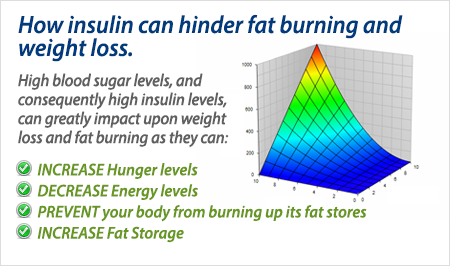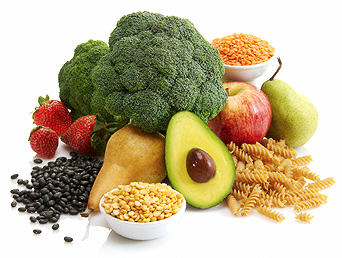Introduction
Insulin is a hormone produced by the pancreas and maintains blood sugar levels by regulating whether your body uses or stores the energy from carbohydrates. When blood sugar levels are high, insulin is released to convert excess blood sugars into glycogen (energy stores). When blood sugar levels drop, insulin levels also drop.
How Insulin Works In The Body
When you eat, your body converts digestible carbohydrates into glucose (also known as blood sugar) which is used by your body as an immediate source of energy.
When blood sugars levels rise too high, insulin is released and this stimulates the cells in the liver, muscles and fat tissue to take up glucose from the blood. The excess glucose is then stored in the liver and muscles as glycogen (energy stores). When blood sugars levels start to drop, the amount of insulin released also drops and blood sugars level begin to stabilise.

As mentioned above, insulin tells your body to remove excess glucose from the blood and store it for future use.
When you eat foods high in sugar (one form of carbohydrate, sometimes referred to as simple carbs) – such as cakes, sweets, fruit juice, sugary drinks and refined foods like white bread, white pasta and white rice – your pancreas goes into overtime to produce the insulin necessary for all this blood sugar to be used for energy.
A surge of insulin causes too much glucose to be transported out of the blood and this causes blood sugar and insulin levels to drop below normal. This leaves you feeling tired and hungry and wanting to eat more as your blood sugar levels are now too low. This then turns into a vicious cycle as when your blood sugars are too low, it makes you want to eat something with high sugar content.
It’s not the best situation to be in when you are trying to burn fat and lose weight.
“High levels of insulin can prevent fat burning and increase fat storage.”
When insulin levels are high, glucose is removed from the blood and excess glucose is stored as energy stores. Unless your body uses these energy stores, they essentially turn into body fat.
It is impossible to burn fat whilst having high levels of insulin in your system. This is because high levels of insulin inhibit the release of glucagon – not to be confused with glycogen.
Glucagon is a hormone also secreted by the pancreas and it has the opposite effect to insulin by raising blood sugar levels. When blood sugar levels drop too low, glucagon is released and it causes the liver to convert glycogen (energy stores sometimes called fat stores) back into glucose to be used as energy. Therefore insulin and glucagon work together to stabilise blood sugar levels.
So the important message for weight loss and fat burning is that high insulin levels prevent fat burning.
“High insulin spikes can prevent muscle gain.”
We now know that insulin turns off fat burning and turns on fat storage, but along with this it can also cause lean muscle loss.
This is because when insulin brings down the blood sugar levels it can “over correct” (glucagon release) and cause low blood sugar. The body usually controls low blood sugar by releasing energy from stored fat, but when insulin is high this can’t happen.
So the only source of energy it can use is muscle protein. In other words when this happens you’ll be gaining fat while losing lean muscle. Once again that’s not good, when you want to lose the pounds or add lean muscle.
Women Are More Sensitive to The Effects of Insulin than Men
One of the reasons many women seem to have a leaner upper body in comparison to their lower body, is that their lower body fat is more sensitive to insulin spikes than their upper body.
A small rise in insulin can shut down fat burning on her lower body. Keeping insulin levels stable throughout the day, is the best way to combat this.
Here’s a way to help this and still eat some of your favorite carbs.
Only eat small, low GI meals for both breakfast and lunch. Then you can eat a higher carb meal after your afternoon workout as your body can cope with a spike in your blood sugar, when your muscles are somewhat starved.
How to Maintain Steady Insulin Levels

Maintaining blood sugar levels is the key to weight loss and fat burning as it keeps your energy levels constant, it prevents hunger pangs and it allows your body to access its glycogen stores (fat stores) as a source of energy when needed.
To maintain your blood sugar levels you need to eat foods which will not spike (increase) your blood sugar levels and consequently, your insulin levels. The key culprit that affects blood sugar levels is carbohydrates. However, there are good types of carbohydrates and bad types.
Foods high in slow releasing carbs (sometimes called complex carbohydrates), such as whole grains and vegetables, should be an important part of your diet. Whereas foods high in sugars (sometimes called simple carbohydrates), such as cakes, sweets and refined foods like white bread, white pasta and white rice should be avoided as these foods could spike insulin levels.
You may have heard of the term low GI and high GI?
GI referrers to the glycemic index which ranks carbohydrates according to their effect on blood sugar levels. Low GI foods are burned steadily throughout the day to give you a constant supply of energy. High GI foods can spike insulin levels and are also readily transported to fat cells if you don’t burn them off quickly.
To read more about the glycemic index click here to read an in-depth article about carbohydrates.
Eating Protein rich meals helps keep insulin levels steady
Protein’s steady release of energy means it’s sustained and doesn’t cause your blood sugar and therefore insulin to spike like carbs, so you get fewer craving.
Protein also helps because it takes your body longer to digest, making you feel fuller for longer. Longer digestion also uses more calories and raises your core body temperature and metabolic rate, known as “thermogenesis”.
Below are some tips to keep blood sugar and insulin levels stable:
- Eat low GI foods
It is vital that you eat low GI foods as these contain slow releasing carbs which do not spike insulin levels. Slow releasing carbs are harder for the body to break down which means smaller amounts of glucose are released over a period of time. This helps to maintain blood sugar levels which decreases hunger pangs and allows your body to access its fat stores for energy. Click here to read more about Low GI Foods.
- Avoid high GI foods
High GI foods will spike your insulin levels. As mentioned above a spike in insulin levels leaves you feeling hungry, less energetic, stops your body from burning fat. Click here to read more about high GI foods. - Eat small and often
Eating 5-6 small meals/snacks a day, every 2-4 hours, is extremely important. It helps to stabilize blood sugar levels and thus, helps to keep a steady flow of insulin in the blood. - Eat high fibre snacks
Snacks and meals high in fibre (a complex, slow releasing carbohydrate) help to regulate your blood sugar level. Fibre slows down glucose absorption and your rate of digestion which helps to keep blood sugar levels stable. Always look out for the fibre content on the nutritional information on foods and ensure that it is higher than the sugar levels. High fibre snacks include wholegrain cereals, nuts and seeds. - Never skip a meal
Skipping meals lowers your blood sugars and puts your body in to starvation mode. Therefore, when you do eat, your body stores the glucose from foods as fat. If you regularly skip meals, your body does not know when to expect the next meal and will store all food as fat. - Plan food ahead
It is important to plan your food ahead, especially when you’re away from home and cannot grab a healthy snack as and when you need it. Planning ahead will ensure that you eat healthy snacks and meals at regular intervals to maintain blood sugar levels. You then won’t be tempted to snack on junk food.
Remember – healthy eating is crucial for weight loss, fat loss and long-lasting results. It’s about making a permanent life-style change away from processed, refined, sugary, junk food towards whole, clean, healthy foods. To find out more about how to change and improve your diet, click here to read diet plans for:




To Recap
The key message is that controlling insulin levels, and preventing them from rising too high, is the major factor effecting fat burning and weight loss. You can’t have high levels of insulin in your system while burning fat at the same time.
Maintaining blood sugar levels and eating a lower carb and higher protein diet is a much more effective, healthy and natural way to lose weight compared to the traditional method of calorie counting. Although calorie intake should still be monitored, stabilizing insulin levels is crucial if you want to successfully lose weight and tone up.

 It is vital that you eat low GI foods as these contain slow releasing carbs which do not spike insulin levels. Slow releasing carbs are harder for the body to break down which means smaller amounts of glucose are released over a period of time. This helps to maintain blood sugar levels which decreases hunger pangs and allows your body to access its fat stores for energy. Click here to read more about Low GI Foods.
It is vital that you eat low GI foods as these contain slow releasing carbs which do not spike insulin levels. Slow releasing carbs are harder for the body to break down which means smaller amounts of glucose are released over a period of time. This helps to maintain blood sugar levels which decreases hunger pangs and allows your body to access its fat stores for energy. Click here to read more about Low GI Foods.
Hello Emilia!
I am down 11 lbs since Easter. I might be insulin resistant, but it does not really matter as I found success in cutting bad carbs out of my diet. I could not drop a pound even when I was going to the gym. Very frustrating. Since eating lean protein and mostly green veggies and brown rice( for example), my body is finally responding. I keep my snacks limited to nuts and almonds and sugar free jello!
Although I started before I read this article, I am essentially doing what the article suggests and it definitely works.
Fantastic, thanks for sharing your experience James! 🙂